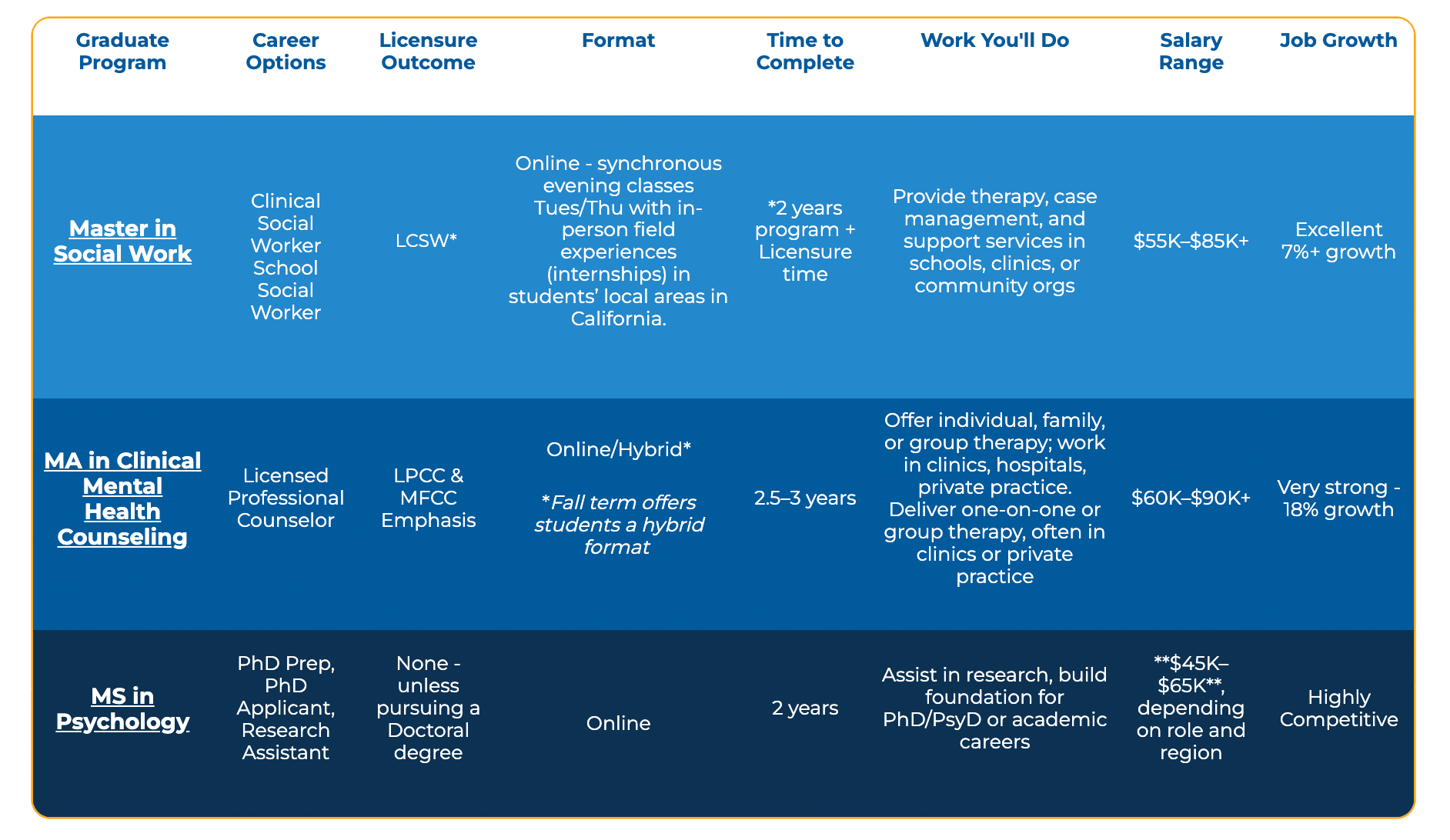
How to Start Your Journey to a Master’s Degree and a Career in Behavioral and Mental Health

If you’re thinking about getting an education and training to start a career in mental health — whether as a therapist, counselor, social worker, or advocate — congratulations: You’re on the way to one of the most meaningful careers, dedicated to improving the mental health of people everywhere. It’s also a quickly-growing and financially rewarding field, with nearly 50,000 new jobs opening in mental health every year.
However, navigating the start of the journey toward a career in mental health can be confusing — especially if you don’t have anyone to turn to for guidance.
In this guide, we break down the steps you need to take to start a career in mental health, including what you need to do to get both your bachelor’s and master’s degrees (and how you can get on a fast-track to completing both at Palo Alto University!).
Starting with Your Bachelor’s Degree
The first program you’ll need to complete to become a therapist is an undergraduate program, or a bachelor's degree (BA or BS).
Traditionally, undergraduate programs take 4 years or more to complete. The exact length of time it takes to get your bachelor’s degree can depend on many factors, including:
- Whether you attend full-time or part-time
- If you transfer credits from another school
- How many courses you take per semester
- Your chosen major or concentration
How to Select an Undergraduate Program
Technically, you can get your undergraduate degree in any field — even fields unrelated to mental health — and still go on to get your master’s degree in psychology (or another mental health degree). But if you already know that you want to start a career as a therapist, it’s highly recommended to get an undergraduate degree in a mental health-related field as well.
Getting a bachelor’s degree in psychology will give you an important foundation for launching your mental health career. You’ll learn the basics of the field and be better academically prepared for the subjects you’ll cover in your master’s degree program (which you’ll be required to complete before becoming a therapist).
In some cases, getting a bachelor’s degree in a mental health-related field could also make you eligible for entry-level jobs in the field. These jobs won’t allow you to practice therapy, but they can help you get valuable experience working with people and communities — experience that will serve you throughout your journey to becoming a therapist.
What to Major in to Become a Therapist
Some examples of bachelor’s degrees you might consider to become a therapist in the future include:
- Psychology and social action: This is a unique program offered by Palo Alto University. In addition to psychology, you’ll complete courses in sociology, economics, anthropology, and more to build a special focus on community advocacy and outreach.
- Business psychology: This degree offered at PAU is ideal for transfer students who want to learn how to apply psychology concepts to solving practical business problems.
- Psychology: This is a standard bachelor’s degree offered at most universities, where you’ll focus on studying the human mind and behavior.
- Behavioral Science: This degree studies human behavior from a scientific perspective, blending psychology, sociology, and other fields to understand and predict behavior in various contexts.
- Developmental Psychology: This degree focuses on how people grow and change throughout their lives, often with a special focus on childhood. You will study cognitive, emotional, and social development at different life stages.
- Social Work (BSW): A Bachelor of Social Work prepares students to help individuals and communities by providing services in areas like mental health, education, and social justice.
Regardless of the exact degree you choose, make sure that the university (and the program) is accredited. Many master’s degree programs require a bachelor’s degree from an accredited institution in order to be accepted.
Getting Your Master’s Degree
Completing your bachelor’s degree is just the beginning of an exciting new career. After you’ve graduated, it’s time to select and complete your graduate program and get your master’s degree.
To get a license to practice as a mental health therapist, you need (at minimum) a master’s degree in an appropriate field. Traditionally, master’s degrees can take 2 to 3 years to complete.
This can sound intimidating at first, especially if you’re a first-generation college student. But graduate school isn’t as far out of reach as you might have assumed. The world needs future therapists like you.
How to Select a Graduate Program
It’s important to carefully consider what you get your Masters degree in if you’re looking to become a therapist. Not all master’s degrees are eligible for licensure after graduation. Some, like master’s degrees in psychology or behavioral science, only allow you to work in research or academia.
If you want to practice therapy, you’ll need to get a master's degree in a clinical area.
Some of the most common master’s degrees that allow you to become licensed as a therapist include:
- Master of Social Work (MSW): This degree is best suited for people who have a passion for working with communities and taking a social advocacy approach to mental health. With an MSW, you can become a licensed clinical social worker (LCSW).
- Master's in Clinical Counseling: This degree allows you to become a therapist or mental health counselor in a wide range of settings, including telehealth, schools, health clinics, and more. With this degree, you can become a licensed professional clinical counselor (LPCC). You may also be eligible for an additional licensure as an LMFT.
- Master's in Marriage and Family Therapy: You might choose this option if you primarily want to work with children and families. With this degree, you can become a licensed marriage and family therapist (LMFT).
Just like your undergraduate degree, it’s essential to get your Master’s from an accredited college or university. State licensing boards will require this when you apply for your clinical license to practice therapy.
Fast-Track Bachelor's-to-Graduate Mental Health Degree
If this all sounds overwhelming, you’re not alone. Planning out every step it takes to become a licensed therapist the traditional route can feel understandably daunting.
You might have valid concerns, like:
Will I need to quit my job?
How will I financially support myself all those years?
Can I really get a job as a therapist after graduating?
Fast-track Bachelors-to-grad programs, like the one offered at Palo Alto University, provide a quicker and more flexible approach to meeting all of the education requirements to start your career as a therapist.
With our program, you can earn both a bachelor’s and a licensure-eligible master’s degree in as little as 3 years. This pathway is specially designed for people like you, who:
- Are working adults and need a flexible program of study with online evening classes
- Have experience working in a behavioral health-related field, and want to turn their experience into college credits
- Want real-world experience that they can apply after graduation
- Have completed some college units and are ready to transfer
- Are looking for individualized guidance during their educational and post-grad journey
We have two bachelors-to-masters pathways available for future therapists, depending on what you’re looking for in your career.
 All of our master’s degree programs are accredited by the Council for Accreditation of Counseling & Related Educational Programs (CACREP). The clinical master’s programs listed above are also licensure-ready, meaning that from the moment you graduate, you’ll be on the road to getting licensed as a therapist in your state.
All of our master’s degree programs are accredited by the Council for Accreditation of Counseling & Related Educational Programs (CACREP). The clinical master’s programs listed above are also licensure-ready, meaning that from the moment you graduate, you’ll be on the road to getting licensed as a therapist in your state.
Steps to Take After Graduation
After you graduate with your master’s degree in a clinical field, you must get real-world clinical experience in order to become a licensed therapist. While you’re accumulating these clinical hours, you’ll work under the supervision of a licensed and experienced therapist.
These are real-world clinical jobs as pre-licensed mental health providers, not unpaid internships. The exact number of hours you need to become licensed depends on your licensure path and state, but it typically takes around 2 years (after graduating with your master’s).
You can get this clinical experience in settings like:
- Private mental health practices
- Non-profit organizations
- Health clinics and hospitals
- Schools and universities
- Telehealth platforms
Once you’ve:
- completed your clinical hours,
- passed your licensure exam,
- and submitted the necessary paperwork,
You will receive your license to independently practice as a mental health therapist in your state. This opens up so many additional job opportunities that may have not been available to you as a pre-licensed therapist.
Career Opportunities You Can Expect
According to the Bureau of Labor and Statistics, the mental health counseling career is projected to see a nearly 20% increase in job openings between 2020 and 2030 — much higher than the 3% average across other careers. This translates to more job security and higher future earnings for you.
Some of the fastest-growing and financially-rewarding occupations in the field include:
- Telehealth or virtual therapist
- Youth and adolescent counselor
- Social justice and identity-affirmative counseling
- Trauma therapist
- Substance use therapist
- Marriage and family therapist
Generally, therapists in these roles make up to $90,000 annually, although therapists in private practice can make $130,000 or more.
Takeaway
Your community needs people like you to become therapists, and uncertainty around the educational requirements doesn’t need to hold you back. Step by step, you can work toward completing your bachelor’s and master’s degrees and starting your licensure process.
With Palo Alto University’s fast-track Bachelors-to-Masters programs in mental health, you can finish your education in as little as 3 years and finish with a licensure-ready master’s degree.
Schedule a 1:1 with a PAU advisor to see how our Bachelors-to-Masters Degree pathway could fit your goals.
 About the Author
About the Author
Saya Des Marais, MSW
Saya is an extensively published writer in the mental health space. She graduated with her Master in Social Work (MSW) in 2010 and worked as a therapist in a wide variety of community settings before becoming a writer. You can learn more about her on her website.
